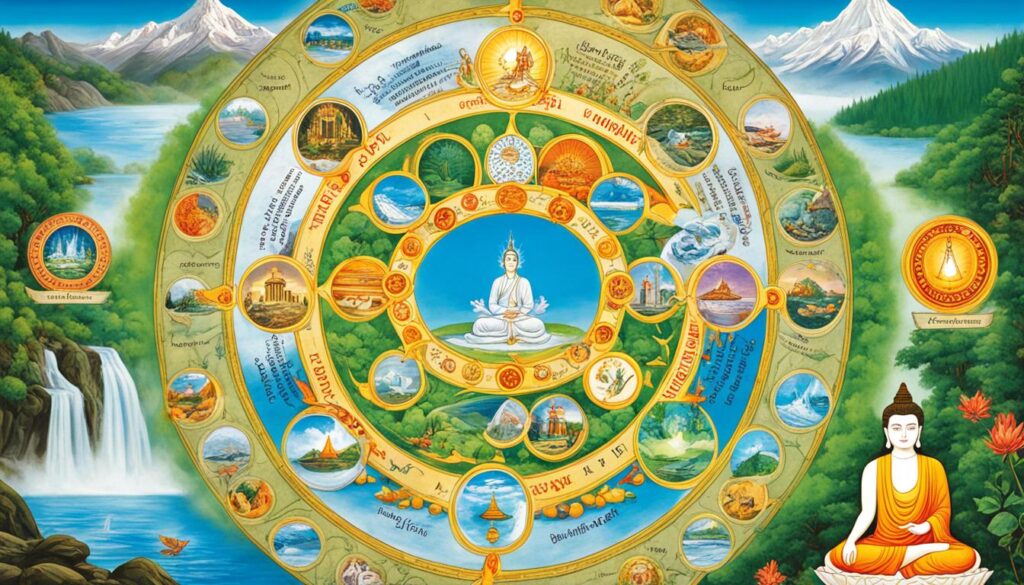“Thousands of candles can be lit from a single candle, and the life of the candle will not be shortened. Happiness never decreases by being shared.” – Gautama Buddha
Buddhism, a major global religion, encompasses a profound understanding of the human experience and offers a path to lasting happiness and liberation from suffering. Founded by Siddhartha Gautama, also known as the Buddha, Buddhism’s core beliefs revolve around recognizing and addressing the root causes of suffering, cultivating compassion and mindfulness, and seeking enlightenment.
In this article, we will delve into the essence of Buddhism’s beliefs, exploring the teachings of the Buddha and the principles that guide this ancient tradition. From the Four Noble Truths to karma and rebirth, impermanence, and the power of meditation, we will uncover the key tenets that shape the Buddhist worldview and provide practical insights for leading a meaningful life.
Key Takeaways
- Buddhism teaches the existence of suffering, its causes, the possibility of its end, and the path to liberation.
- The Four Noble Truths acknowledge suffering, identify its causes, reveal the possibility of its end, and present the Eightfold Path as a guide to liberation.
- Karma plays a role in the cycle of rebirth, where beings are continually reborn based on their actions.
- Buddhism emphasizes the impermanence of all things and challenges the concept of a fixed self.
- Cultivating compassion and practicing the Middle Way lead to harmony and the avoidance of unnecessary suffering.
The Four Noble Truths
The teachings of Buddhism are centered around the Four Noble Truths, which serve as the foundation of understanding Buddhism beliefs. These truths acknowledge the reality of suffering, explain its causes, offer a path to end it, and present the principles of the Noble Eightfold Path that guide practitioners towards liberation.
The First Noble Truth: Recognizing Suffering
The teachings of Buddhism recognize the presence of suffering as an inherent part of human existence. Whether it is physical pain, emotional distress, or the dissatisfaction caused by unfulfilled desires, suffering is a universal experience that cannot be avoided.
The Second Noble Truth: Identifying the Causes
According to Buddhism, desire or craving and ignorance are the root causes of suffering. It is our attachment to desires and the lack of understanding of the true nature of reality that leads to dissatisfaction and perpetual cycles of suffering.
The Third Noble Truth: Attaining Liberation
The teachings of Buddhism offer hope by emphasizing that the end of suffering is attainable. This truth proclaims that liberation from suffering is possible through achieving Nirvana, a state of ultimate peace, enlightenment, and freedom from the cycles of birth and death.
The Fourth Noble Truth: The Noble Eightfold Path
The Noble Eightfold Path outlines the principles and practices necessary to achieve liberation from suffering. It consists of eight interconnected practices: Right Understanding, Right Intention, Right Speech, Right Action, Right Livelihood, Right Effort, Right Mindfulness, and Right Concentration.
Implementing these principles of Buddhism in one’s life can lead to the cultivation of wisdom, ethical conduct, and mental discipline required for spiritual growth and liberation.
| Noble Truth | Description |
|---|---|
| First Noble Truth | Recognizes the presence of suffering |
| Second Noble Truth | Identifies desire and ignorance as the root causes of suffering |
| Third Noble Truth | Signifies that the end of suffering is attainable through achieving Nirvana |
| Fourth Noble Truth | Outlines the Noble Eightfold Path as a means to achieve liberation |
Karma and the Cycle of Rebirth
Buddhism teaches the law of karma, which states that every action carries consequences. Positive actions lead to positive outcomes, while negative actions result in suffering. Karma plays a significant role in the cycle of rebirth, also known as samsara, which refers to the continuous process of being born, dying, and being reborn.
According to Buddhist beliefs, the cycle of rebirth is determined by an individual’s karma, which accumulates throughout their lifetimes. The karma we create through our actions, thoughts, and intentions shapes our future existence. This cycle of rebirth continues until one attains enlightenment and breaks free from the cycle, achieving liberation from suffering.
Buddhism recognizes six realms of rebirth, each representing different states of existence. These realms include:
- The realm of gods, representing celestial beings who experience great pleasure.
- The realm of demigods, characterized by a constant struggle for power.
- The realm of humans, considered the highest realm as it offers opportunities for spiritual growth and liberation.
- The realm of animals, characterized by ignorance and instinct.
- The realm of hungry ghosts, where beings experience insatiable cravings and dissatisfaction.
- The realm of hell beings, associated with intense suffering and torment.
Each realm offers different challenges and opportunities for individuals to cultivate the right actions and beliefs that lead to liberation. The realm of human existence is regarded as precious because it provides the ideal conditions to practice and realize the teachings of Buddhism.

| Realm | Characteristics |
|---|---|
| Gods | Experiencing great pleasure and luxury |
| Demigods | Frequent power struggles and conflicts |
| Humans | Possibility of spiritual growth and liberation |
| Animals | Driven by ignorance and instincts |
| Hungry Ghosts | Constant craving and dissatisfaction |
| Hell Beings | Enduring intense suffering and torment |
Embracing Impermanence and No-Self
One of the core beliefs of Buddhism is the emphasis on the impermanence of all things. In the teachings of Buddhism, it is recognized that everything in the world is subject to change and decay. Clinging to impermanent things ultimately leads to suffering. By understanding and accepting the transient nature of all phenomena, one can free themselves from attachment and find inner peace.
Buddhism also challenges the notion of a fixed self. It teaches that the self is an illusion, a construct created by our minds. This belief is known as the concept of “no-self” or “anatta.” By recognizing that there is no inherent, unchanging self, one can transcend the limitations of ego and experience a deeper sense of interconnectedness with all beings.

The Impermanence of All Things
By embracing the impermanence of all things, Buddhists cultivate an acceptance of change and develop resilience in the face of life’s challenges. This recognition allows individuals to let go of attachments to transient experiences, possessions, and relationships, reducing suffering in the process. The teachings of impermanence remind us to fully appreciate the present moment and to cherish the fleeting beauty of life.
The Illusion of Self
The belief in the illusion of self liberates individuals from the ego-driven desires and cravings that perpetuate suffering. By understanding that the self is not fixed or permanent, we can transcend the narrow confines of our personal identities and expand our compassion to include all sentient beings. This shift in perspective fosters empathy, kindness, and unconditional love, creating a harmonious and interconnected world.
| Key Concepts | Implications |
|---|---|
| Impermanence | Embracing change and living in the present moment |
| No-Self | Transcending ego and cultivating compassion for all beings |
Cultivating Compassion and the Middle Way
In Buddhism, compassion is a guiding principle that encourages practitioners to cultivate love and kindness towards all beings. By practicing compassion, you foster genuine connection and dissolve the roots of hostility. It is through acts of compassion that we create harmony and promote well-being in our world.
The Middle Way is another key belief in Buddhism. It advocates finding balance and avoiding extremes. By steering clear of excessive indulgence or extreme asceticism, we can cultivate a harmonious and fulfilling life. The Middle Way encourages us to approach situations with equanimity, seeking moderation in our thoughts, actions, and desires.
The Power of Compassion
Compassion lies at the heart of Buddhist teachings. When you embrace compassion, you extend kindness and understanding to all living beings, genuinely wishing for their well-being and happiness. This practice goes beyond mere sympathy or empathy; it is an active expression of love and care.
Compassion helps dissolve the roots of hostility, anger, and divisive attitudes. It promotes unity, fostering an inclusive and compassionate society. By embracing compassion, you contribute to creating a more harmonious and peaceful world.
Walking the Middle Way
The Middle Way is a path that emphasizes balance and moderation. It encourages us to navigate between extremes, avoiding excesses and extremes. The Middle Way teaches us to find a harmonious rhythm in our lives, making choices that promote well-being and happiness without falling into the traps of self-indulgence or self-deprivation.
By walking the Middle Way, we create space for contentment and balance. We recognize that true fulfilment lies in finding a middle ground, neither clinging to material possessions nor denying ourselves legitimate needs. The Middle Way offers a compass for ethical living, encouraging us to make conscious choices that align with our values and promote the well-being of ourselves and others.

| The Power of Compassion and the Middle Way | |
|---|---|
| Principles of Buddhism Beliefs | Key Beliefs in Buddhism |
| – Compassion as a guiding principle | – Embracing the Middle Way |
| – Cultivating love and kindness towards all beings | – Finding balance and avoiding extremes |
| – Dissolving the roots of hostility | – Navigating between excess and deprivation |
| – Creating harmony and well-being | – Promoting ethical living |
The Power of Mindfulness and Meditation
In Buddhism, mindfulness and meditation play pivotal roles in deepening one’s understanding of the teachings and beliefs. Through the practice of mindfulness, individuals can cultivate a heightened sense of awareness, observing their thoughts and emotions without judgment or attachment. This non-reactive observation allows for greater insight into the workings of the mind, fostering self-reflection and personal growth.
By embracing mindfulness, you embark on a journey of self-discovery and self-mastery. It enables you to become more attuned to the present moment, appreciating the beauty and richness of each experience. Through mindfulness, you can break free from the chains of past regrets and future anxieties, finding peace and contentment in the here and now.
Furthermore, meditation serves as a powerful tool for developing mental focus and concentration. By dedicating time to sit in stillness and silence, you can quiet the chatter of the mind and cultivate inner clarity. This heightened state of focus allows for a deeper understanding of the subtle nuances of the teachings of Buddhism, awakening profound insights and wisdom.
With consistent practice, meditation can empower you to cultivate a tranquil mind amidst the chaos of everyday life. It enables you to cultivate resilience and emotional well-being, enhancing your ability to navigate challenges with equanimity and grace. By cultivating a regular meditation practice, you create space for self-reflection, introspection, and personal growth.
Benefits of Mindfulness and Meditation
- Improved Mental Well-being: Mindfulness and meditation have been proven to reduce stress, anxiety, and depression, promoting overall mental well-being.
- Enhanced Cognitive Function: Regular practice improves focus, concentration, and memory, allowing for more clarity and efficient decision-making.
- Increased Self-Awareness: Mindfulness and meditation foster a deeper understanding of oneself, enabling personal growth and transformation.
- Cultivation of Compassion: By developing mindfulness and deepening one’s understanding of interconnectedness, individuals can cultivate compassion and empathy for others.
- Spiritual Growth and Enlightenment: Mindfulness and meditation serve as vehicles for self-realization and spiritual awakening, leading to enlightenment and liberation.
Through the profound practices of mindfulness and meditation, you can embark on a transformative journey of self-discovery, personal growth, and spiritual awakening. These practices provide powerful tools for understanding the teachings of Buddhism and experiencing the profound depths of its beliefs.

| Mindfulness | Meditation |
|---|---|
| Enhances self-awareness | Develops mental focus and concentration |
| Reduces stress and anxiety | Fosters emotional well-being |
| Cultivates compassion and empathy | Allows for self-reflection and introspection |
| Deepens understanding of interconnectedness | Promotes spiritual growth and enlightenment |
The Essence of Buddhism: The Ten Core Tenets
Buddhism encompasses ten core tenets that form the foundation of its beliefs and practices. These tenets guide Buddhists on their spiritual path and provide insights on how to navigate life’s challenges.
1. Recognition of Universal Suffering
The first core belief of Buddhism is the recognition of the universality of suffering. Buddhism acknowledges that suffering is an intrinsic part of human existence and extends to all sentient beings.
2. Understanding the Causes of Suffering
In Buddhism, understanding the causes of suffering is crucial. It is believed that desire and attachment, rooted in ignorance, are the primary causes of human suffering.
3. Liberation from Suffering
Buddhism teaches that liberation from suffering is possible. By embracing the teachings and following the Noble Eightfold Path, individuals can attain liberation and find freedom from the cycle of suffering.
4. Karma and the Cycle of Samsara
Karma is another significant belief in Buddhism. It states that actions have consequences, and individuals are responsible for their actions and the outcomes they bring. Through the cycle of samsara, beings are continuously reborn based on their karma.
5. Impermanence
Buddhism emphasizes the impermanence of all things. Everything in the world is subject to change and decay, including our own selves. Recognizing the impermanence of existence helps in reducing attachment and suffering.
6. Illusion of Self
In Buddhism, the concept of self is considered an illusion. There is no fixed, permanent self, and clinging to the idea of self leads to suffering. Understanding the illusion of self is essential for attaining liberation.
7. Cultivating Loving-Kindness
Buddhism encourages the cultivation of loving-kindness towards all beings. By practicing kindness, compassion, and empathy, individuals foster harmony and connection with others, reducing conflicts and building a more compassionate world.
8. Striving for Nirvana
Nirvana is the ultimate goal in Buddhism. It is a state of liberation, freedom from suffering, and the cessation of the cycle of rebirth. Striving towards Nirvana is a central practice in Buddhism.
9. Mindfulness and Meditation
Mindfulness and meditation play a significant role in Buddhism. Through mindfulness, individuals cultivate awareness and observe their thoughts and emotions without judgment. Meditation helps develop concentration, clarity, and insight into the nature of mind and reality.
10. Guidance from Enlightened Teachers
Buddhism values the guidance of enlightened teachers, known as gurus or masters. These teachers provide teachings, guidance, and inspiration to their students, helping them deepen their understanding and practice of Buddhism.
| Ten Core Tenets | Description |
|---|---|
| Recognition of Universal Suffering | Acknowledgment of the presence of suffering in all sentient beings. |
| Understanding the Causes of Suffering | Identification of desire and attachment as the root causes of suffering. |
| Liberation from Suffering | Belief in the possibility of freedom from suffering through the Noble Eightfold Path. |
| Karma and the Cycle of Samsara | Recognition of the law of karma and the cycle of rebirth based on one’s actions. |
| Impermanence | Acknowledgment of the transitory nature of all things. |
| Illusion of Self | Understanding that the concept of a fixed self is an illusion. |
| Cultivating Loving-Kindness | Emphasizing the importance of kindness and compassion towards all beings. |
| Striving for Nirvana | Aspiring towards the ultimate goal of liberation and cessation of suffering. |
| Mindfulness and Meditation | Practice of mindfulness and meditation for developing awareness and insight. |
| Guidance from Enlightened Teachers | Valuing the teachings and guidance of enlightened masters. |
Conclusion
Exploring Buddhism beliefs offers profound insights into understanding suffering, embracing impermanence, cultivating compassion, and finding inner peace. By delving into the core beliefs of Buddhism, you can gain a deeper understanding of yourself, your place in the world, and how to lead a meaningful and fulfilling life.
Through Buddhism’s teachings, you can find guidance for personal growth, mental well-being, and spiritual enlightenment. By embracing the essence of Buddhism, you can bring serenity, happiness, and harmony to your life. The principles of Buddhism provide a roadmap to navigate life’s challenges and cultivate a sense of purpose and contentment.
By understanding the nature of suffering, you can develop resilience and compassion towards yourself and others. Embracing impermanence allows you to let go of attachment and find peace in the present moment. Cultivating compassion fosters connection and promotes a more harmonious and inclusive society.
Ultimately, Buddhism offers a path to self-discovery and spiritual growth. By practicing mindfulness and meditation, you can cultivate a deep understanding of the teachings of Buddhism and embark on a transformative journey towards enlightenment. Exploring Buddhism beliefs can open doors to profound personal transformation and create a life of greater meaning, purpose, and fulfillment.
FAQ
What are the core beliefs of Buddhism?
The core beliefs of Buddhism are encapsulated in the Four Noble Truths, which recognize the existence of suffering, its causes, the possibility of its end, and the path to liberation. Additionally, Buddhism emphasizes concepts such as karma, the cycle of rebirth, the impermanence of all things, and the pursuit of Nirvana.
What are the Four Noble Truths?
The Four Noble Truths form the essence of Buddha’s teachings. They acknowledge the reality of suffering, explain its causes, offer a way to end it, and present the Eightfold Path as a guide towards liberation.
How does Buddhism view karma and the cycle of rebirth?
Buddhism teaches the law of karma, which states that every action carries consequences. Positive actions lead to positive outcomes, while negative actions result in suffering. Karma plays a role in the cycle of rebirth, where beings are continually reborn into different realms based on their karma.
What is the significance of impermanence and no-self in Buddhism?
Buddhism emphasizes the impermanence of all things. Everything in the world is subject to change and decay, and clinging to impermanent things leads to suffering. Buddhism challenges the notion of a fixed self, teaching that the self is a transient illusion.
How does Buddhism promote compassion and the Middle Way?
Compassion is a central tenet of Buddhism. Practicing love and kindness towards all beings fosters connection and helps dissolve the roots of hostility. Buddhism advocates for the Middle Way, which is finding the balance between extremes.
What role does mindfulness and meditation play in Buddhism?
Buddhism places great importance on mindfulness and meditation. Through mindful awareness, one observes thoughts and emotions impartially, gaining insight into oneself and the world. Meditation helps develop mental concentration, focus, and wisdom.
What are the ten core tenets of Buddhism?
The ten core tenets of Buddhism include recognizing the universality of suffering, understanding its causes, and realizing that liberation from suffering is possible. The teachings also emphasize the importance of karma, the cycle of samsara, impermanence, the illusion of self, cultivating loving-kindness, and striving for Nirvana.
What can Buddhism offer in terms of personal growth and spiritual enlightenment?
Buddhism offers profound insights into understanding suffering, embracing impermanence, cultivating compassion, and finding inner peace. Its teachings provide guidance for personal growth, mental well-being, and spiritual enlightenment.

